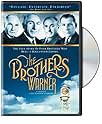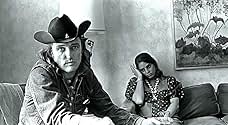Füge eine Handlung in deiner Sprache hinzuAn intimate portrait and saga of four film pioneers--Harry, Albert, Sam and Jack who rose from immigrant poverty through personal tragedies persevering to create a major studio with a social... Alles lesenAn intimate portrait and saga of four film pioneers--Harry, Albert, Sam and Jack who rose from immigrant poverty through personal tragedies persevering to create a major studio with a social conscience.An intimate portrait and saga of four film pioneers--Harry, Albert, Sam and Jack who rose from immigrant poverty through personal tragedies persevering to create a major studio with a social conscience.
- Auszeichnungen
- 1 Nominierung insgesamt
- Self
- (as Sam Goldwyn Jr.)
- Self
- (as Roy Disney Jr.)
- Self - Historian
- (as Dr. Michael Birdwell)
Empfohlene Bewertungen
As Harry's granddaughter, completely whitewashing how he and his wife came to "win custody" of Sam and Lita Warner's daughter tells you everything you need to know. He did it because Sam's wife was not Jewish, she was Catholic. The documentary never makes you aware of this. I can't believe this documentary goes so far to include Sam's daughter saying she had a better life than she would have and then another line with the mother saying she was young at the time. Everything you can read about the situation seems to indicate that she was harassed and bullied into giving up her child by the domineering Harry (who also hated Jack's second wife) so that left a bad taste in my mouth. Not that I expected a report on the family drama, but even a Google search of them will reveal what Cass W tries to sanitize about Saint Harry. There's a whole segment on his courage about calling out the N azis. He was Anti-Hitler but was bigoted towards Catholics in his own family. Mmkay. It would be like leaving Marilyn Monroe out of a profile of JFK that calls him a devoted family man. It just rings hollow and false. Also if you listen, her mother never mentions Sam's daughter even though they were raised as siblings. There's no family photo shown with her included so you kind of just get the sense that it was about control and not what was best for the child. This documentary reminds me of the the book and movie about The Temptations spearheaded by Otis Williams. Everything wrong was David, Eddie, and Paul. Otis never ever made a mistake. This has the same vibe.
Another critique I have is this documentary is not organized very well. It jumps back and forth between the family and the studio but not in a cohesive way all the time. I did skip through at least twice. What Cass Warner adds in the narration you have to take with a grain of salt bc...grandpa. You're actually learning more from the film historians and the interspersed actors and executives who definitely understand the business better than her. And who knew and worked with Jack. He was responsible for so many classics.
She never explores why Jack Warner went behind his brothers' backs with the deal to sell and then rebuy the company. Surely that didn't occur in a vacuum? Surely someone was alive around the time of this doc to share some insight? No internal papers? There's also so little on Albert. I believe his grandson was interviewed, but he didn't seem as if he knew much more than he maybe heard from his father.
It was gross and appalling to hear Cass say that had Jack come to Harry's funeral, he would not have been in the car crash that landed him in a coma. Disgusting. I had to rewind it to make sure I heard correctly. Who says that? Not to mention she never ever approaches her grandfather with any criticism much less saying garbage like this about anything he'd done. Maybe Jack stabbing him in the back was karma for what he did to Sam's wife? She honestly sounds like she's taking jabs at Jack for her grandfather. It's petty.
The only worthwhile parts of this are the video clips and audio of the brothers. I'm in my 30s and while I love classic movies, my introduction to the "WB" was Looney Tunes on Nickelodeon and Tiny Toons after school. It was cool finding out (years ago at this point) that they were real. I enjoyed seeing the footage of them all. And to see films that TCM doesn't air often or at all. Other the original footage, the only thing interesting to me about Cass is her son is married to an actress who was in one of my favorite tv shows growing up.
It's WB month for their 100th anniversary on TCM and I've been enjoying the films being shown. While current WB is a mess (and ironically not a family business anymore), I only checked out this documentary believing it would be something better.
There were a lot of neat facts about the studio. I loved learning how the KKK sued Warner for their depiction in "Black Legion"! Or, how the studio was the first to refuse to sell movies in Germany and made the first anti-Nazi film from Hollywood--even when the nation was firmly in the isolationist camp. Interestingly, the film really didn't focus so much on the stars of the day--but more on the day to day behind the scenes events. I liked this, as if you want to see more about Cagney or Bette Davis, a documentary about them would make a lot more sense.
Overall, this is the sort of film that movie lovers like myself love--especially those who adore Hollywood during the classic years of the 1920s-40s. Fascinating--as it's filled with wonderful little stories and facts that film buffs will love. My only real problem with the film is that there is just too much material for a film that's just a bit over 90 minutes long. A mini-series would really due more justice to the history of this amazing studio.
Oddly, while the documentary was filled with a lot of film clips, some of them were of pretty poor quality--particularly the grainy and washed out one from "Giant". I am really not sure why this was the case.
However, there is no denying that this doc is entertaining. Sibling rivalry is something to which the vast majority of us can relate and when it is presented, as it is here, in all its show biz luridness, with lots of stabbings in the back, mistresses, wives, aneurisms, strokes and tragic deaths, it makes for a fun hour and forty five.
Did I mention that the director is Harry's grand daughter? Give it a B minus.
*** (out of 4)
Pretty good documentary takes a look at the four Warner brothers (Harry, Albert, Jack, Sam) who would end up building one of the greatest and most loved studios in the history of cinema. Although it would seem the family had a lot of great fortune, they were haunted by several early deaths and many ending up turning their backs on one another. If you're looking for a documentary about all the great films released by the studio then you're going to be disappointed because this documentary actually takes a look at the family and not so much the movies. There's several stuff dealing with the movies that gets talked about including the brothers desire to make "real" dramas and how they fought the code and other studios to make a warning about Germany (CONFESSIONS OF A NAZI SPY). I think fans of the history behind this studio will enjoy this doc the most as we get to see a lot of great photos of the boys as well as some video footage. There's quite a bit of talk from the relatives of the Warner's and we have a relative directing the film but don't let that worry you because there's quite a bit of brutal honesty here. Dennis Hopper, Debbie Reynolds, Norman Lear, George Segal, Angie Dickinson, Samuel Goldwyn, Jr. and Tab Hunter are just a few of the people who are interviewed. Some of the best stuff happens early on when we learn how the brothers ended up getting into the movie business and why they eventually moved out West.
Wusstest du schon
- WissenswertesIn the film clip from Casablanca a line is spoken which isn't in the film. The clip is from the end of Casablanca, at the airport, Richard Blaine (Humphrey Bogart) tells Major Heinrich Strasser (Conrad Veidt), "Alright Major, you asked for it" before he shoots him. The actual movie simply has Major Strasser pulling his gun and Rick shooting him.
- PatzerCass Warner Sperling's commentary states that the 1927 film "The Jazz Singer," starring Al Jolson, grossed more than any movie made to that time and remained the all-time box-office champ until the release of "Gone With the Wind." It was actually Jolson's next film, "The Singing Fool," that set the box-office record that lasted until "Gone With the Wind."
- Zitate
Self - Harry Warner's granddaughter, also narrator: The truth is, they were a phenomenal team that built an empire on a dream and revolutionized Hollywood while making the most classic, relevant movies of their time.
- VerbindungenFeatures Der große Eisenbahnraub (1903)
- SoundtracksMe, Myself & I
Written by David Campbell (as David Campbell)
Performed by Ernest S. Llab and Bettie Ross
By Arrangement with DRC Music
Top-Auswahl
Details
- Laufzeit1 Stunde 34 Minuten
- Farbe
- Seitenverhältnis
- 1.78 : 1
Zu dieser Seite beitragen

















